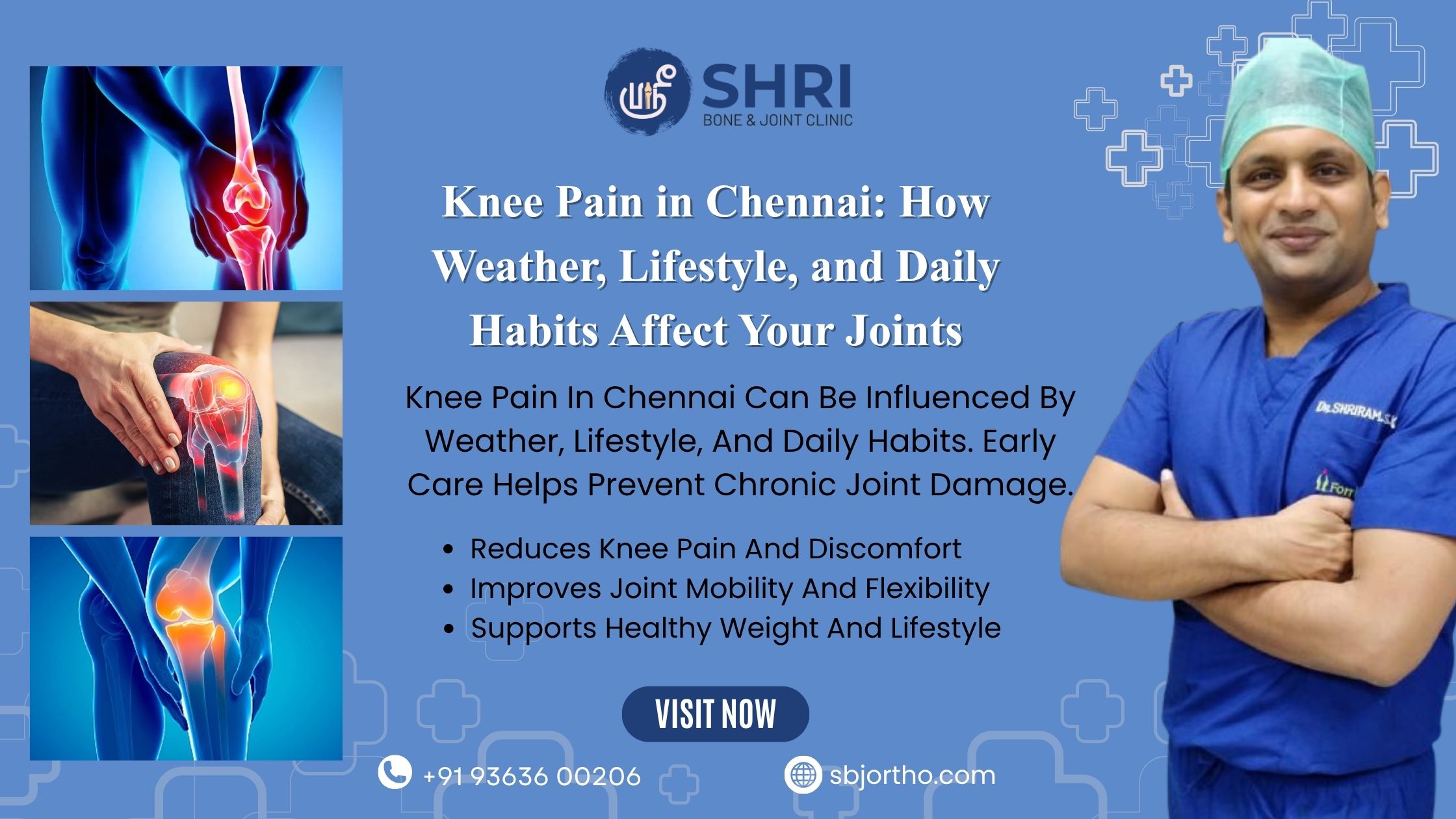Knee pain is one of the most common orthopedic complaints among people living in Chennai. Whether it’s a sharp pain after climbing stairs, stiffness in the morning, or discomfort after long commutes, many Chennai residents experience knee issues that affect their ability to work, walk, and stay active.
Surprisingly, knee pain in Chennai is not caused by one single factor—it’s influenced by weather patterns, daily routines, road conditions, commuting habits, and even cultural practices.
This blog explores how Chennai’s unique lifestyle impacts knee health, and when it may be time to consider medical evaluation or advanced treatments available at centers like Shri Bone & Joint Clinic, led by Dr. Shriram Krishnamoorthy, Orthopedic Specialist.
How Chennai’s Weather Affects Knee Pain
Chennai’s tropical climate, with its heat, humidity, and monsoon pressure changes, has a direct impact on joint comfort. Here’s how:
1. High Humidity Increases Joint Stiffness
Humidity affects the fluid inside your joints. When moisture in the air rises:
- Joint tissues may swell
- Movement becomes stiffer
- Pain thresholds decrease
People with arthritis often notice increased discomfort during humid months.
2. Sudden Climate Shifts Trigger Pain Flare-Ups
Moving from:
- Air-conditioned rooms → Hot outdoor temperature
- Humid air → Sudden rain
can cause pressure changes that affect joint receptors, increasing knee pain.
3. Dehydration During Hot Days
In Chennai’s heat, many people sweat more and drink less water. Low hydration affects joint lubrication, leading to:
- Increased friction
- Fatigue
- Muscle tightness
All of these can worsen knee discomfort.
Lifestyle Factors in Chennai That Worsen Knee Pain
1. Long Hours of Sitting at Work
Many Chennai professionals—especially IT employees, accountants, customer service workers, and designers—spend 8–10 hours sitting daily.
Prolonged sitting weakens the thigh muscles, reducing knee support.
2. Driving Two-Wheelers in Traffic
Chennai has one of India’s highest two-wheeler populations. Continuous braking and foot pressure on the ground increase knee strain, especially on:
- OMR
- Mount Road
- Chrompet
- Anna Salai
Long commutes also worsen joint stiffness.
3. Stair Climbing in Apartment Buildings
Most Chennai apartments do not have lifts beyond the ground-plus-two level. Repeated stair use strains:
- Knee cartilage
- Ligaments
- Meniscus
This is one of the most common causes of chronic knee pain in middle-aged adults.
4. Walking or Jogging on Hard Surfaces
Chennai roads and pavements are mostly concrete. Hard impact surfaces can lead to:
- Early cartilage wear
- Patellofemoral pain
- Ligament stress
Even popular walking areas like Marina Beach and Besant Nagar Beach have uneven terrain that can strain the knee.
5. Cultural Habits
Certain practices increase knee bending load:
- Sitting cross-legged
- Using Indian toilets
- Sitting on the floor during prayer or family gatherings
These positions place extreme pressure on the knee joint, especially in older adults.
Daily Habits That Make Knee Pain Worse
Some everyday activities unintentionally worsen knee pain:
1. Wearing Unsupportive Footwear
Flat slippers and sandals, commonly worn due to Chennai’s heat, offer little arch support.
2. Skipping Warm-Ups
Sudden activity—like climbing stairs or brisk walking without warming up—can shock knee joints.
3. Overuse of Painkillers
Many people rely on OTC pain medications, which reduce pain temporarily but do not treat underlying problems.
4. Lack of Strength Training
Weak muscles around the knee increase joint load, making pain unavoidable.
When Should You Seek Medical Help?
You should consult a specialist if:
- Knee pain persists for more than 2–3 weeks
- Pain disrupts walking or sleep
- Swelling occurs after activity
- Sharp pain radiates down the leg
- Climbing stairs becomes difficult
- Knees make clicking or grinding sounds
At Shri Bone & Joint Clinic, Dr. Shriram Krishnamoorthy evaluates knee pain using physical examination, imaging, and functional assessment to determine the true cause.
Non-Surgical Treatment Options for Knee Pain
Many patients recover without surgery when they receive the right treatment at the right stage.
Here are some common non-surgical options.
1. Physiotherapy & Strength Training
Helps strengthen thigh muscles, correct imbalances, and restore joint stability.
2. Weight Management & Lifestyle Correction
Reducing excess load reduces knee stress significantly.
3. Anti-Inflammatory Support
Ice, rest, and guided activity modifications improve recovery.
Injection-Based Treatments for Knee Pain
When pain persists despite basic measures, targeted injections may be recommended.
1. Steroid Injection for Knee Pain in Chennai
A steroid injection for knee pain in Chennai helps reduce inflammation quickly during severe flare-ups. It’s useful for:
- Swelling
- Morning stiffness
- Acute pain
Relief is usually felt within a few days.
2. PRP Injection for Knee Pain in Chennai
A PRP injection for knee pain in Chennai uses the patient’s own platelet-rich plasma to support natural healing. It can:
- Improve cartilage health
- Reduce chronic pain
- Enhance mobility
This is ideal for early-to-moderate arthritis.
3. Gel Injection for Knee Pain in Chennai
A gel injection for knee pain in Chennai acts like artificial joint lubrication. It helps:
- Reduce friction
- Improve smooth movement
- Support long-term comfort
Helpful for patients with cartilage thinning and joint dryness.
Advanced Care for Chronic Knee Pain
If knee pain progresses despite non-surgical treatment, experts like Dr. Shriram Krishnamoorthy may discuss minimally invasive or surgical options, depending on the severity of damage.
Early diagnosis gives the best possible outcome.
FAQs
What type of knee pain is common in Chennai?
Weather-related stiffness, arthritis flare-ups, stair pain, and pain from long commutes are common.
Does Chennai humidity worsen knee pain?
Yes. High humidity increases joint swelling and muscle tightness.
Is knee pain reversible?
Many cases improve with early treatment, physiotherapy, lifestyle correction, and targeted injections.
Do injections cure arthritis?
Injections help reduce pain and improve movement but do not “cure” arthritis. They slow progression and provide long-term comfort.
When should I see an orthopedic specialist?
If knee pain lasts more than two weeks, worsens with activity, or affects daily life.
Conclusion
Knee pain in Chennai is influenced by climate, lifestyle, commuting habits, and daily routines. Understanding these factors helps you take preventive steps and seek timely care.
With options ranging from physiotherapy to Knee Pain Treatment in Chennai, and advanced solutions like Steroid Injection for Knee Pain in Chennai, PRP Injection for Knee Pain in Chennai, and Gel Injection for Knee Pain in Chennai, patients have multiple pathways to recovery.
Staying active, maintaining strength, and addressing symptoms early can significantly reduce the burden of knee pain and improve long-term joint health.

